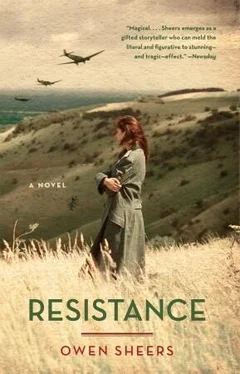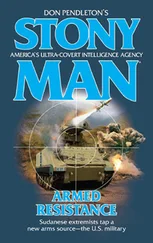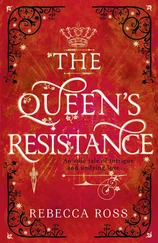Albrecht nodded but said nothing more. “This day.” He hated the way they spoke. Everything ordained, their quasi-biblical language, no trace of the months and years of failure, of the breaking of spirits and bodies. Just the inevitable march of time towards “this day.” Of course, he’d repeated again and again to himself as they’d made their way back to the village. “Of course, of course, of course.” The words wouldn’t go away. They chased each other inside his skull, the one collapsing into the other, faster and faster. He couldn’t rid himself of the phrase; the banal certainty of it chased him through his dreams. Of course, of course. He could not argue against it. He was part of it. The great “of course” of National Socialism. He thought of the English translation, and again the semiotic flexibility of the language struck him as so suitable. Of course. On course. He was travelling along the Nazi course, its route, its path. There was no getting off, there were no side roads. Everything was planned and was falling into place and there was nothing he, Albrecht Wolfram, could do about it, other than join the flow. Of course, of course. Even two days later as he lay down to sleep in the comfort and quiet of Oxford itself, this insistent mantra wore away at his mind, eroding his consciousness until he finally gave way to a fitful slumber.
Oxford had been a welcome diversion from their irregular journeying. They’d spent three days in the city, enjoying the rest, the feel of fresh linen against newly washed skin. Albrecht’s mind began to calm again. Freed from any specific duties, he allowed the men to explore the city. He watched them walk away down Broad Street, this little band he’d extracted from the flow of the war. Otto and Gernot walked a few yards behind the others, their heads tipped back, drinking in the strange beauty of the buildings, the grinning grotesques and the pipe-swallowing gargoyles. As they turned the corner at the end of the street, Albrecht saw Gernot stretch out an arm and point towards the skyline. He leant his other hand on Otto’s shoulder. Albrecht thought he saw Otto smile as Gernot peeled away into that peculiar laugh of his, the laugh that had singled him out for this mission in the first place.
For Albrecht the city struck a more unsettling note. It was certainly a welcome return, to see his old haunts again, to find himself remembering the streets and shortcuts of the back alleys. But his memories were tinged with the echo of regret. A regret for lost time, for that year he’d spent here, out of the world that had been at that very moment racing so inevitably towards this; his return six years later, the heels of his jackboots clicking over the broken flagstones of silent college cloisters.
While the men roamed the parks and colleges of the city, Albrecht spent the three days roaming the stacks of the Bodleian Library running beneath its streets. Together with a surprisingly pliant English archivist, he’d gathered a useful collection of books relevant to his mission. He wanted to learn as much as he could before he arrived, but he was also driven by a more general sense of pleasure at being among books again. It had been so long; the weight of words in his hand, the promises of opening pages. For years he’d been able to carry only a couple of volumes with him — a battered copy of Rilke’s sonnets, von Eschenbach’s Parzival . Now for three days he had the stocks of the world’s greatest library spread out before him and like a desert wanderer stumbling upon an oasis, he drenched himself with the smells and textures of the printed page.
As always it did not last long. Advances in the west meant they could continue their mission, and on the fourth morning they packed their belongings in the staff car and joined a convoy heading out of the city. Their lodgings had been more than comfortable. The rooms of a professor whose name had appeared among the thousands of others tightly printed in the Gestapo’s Black Book. The professor had been taken for questioning in his pyjamas on the morning of their arrival. The patrol moved in half an hour later and found his quarters just as he’d left them, food in the larder, fresh flowers on the table, and a record slowing on a windup gramophone, the needle softly thudding in the final groove. When they left three days later Albrecht hadn’t been able to resist, and as Alex started the car he’d loaded the gramophone and a kit bag of recently introduced 33rpm records onto the backseat. Alex raised his eyebrows and said something Albrecht couldn’t catch above the rumble of the passing traffic. “Well,” he’d shouted in reply, “we’ll need something to keep us entertained up there!”
The roadside bomb had been a sudden and brutal reintroduction back into the war. They were just a few miles outside the city when it happened, the convoy snaking through the B roads between the Cotswold villages. The troop carrier in front of them had taken the force of the blast, its front wheels torn from the chassis, the driver’s cab and the canopy set ablaze. Some shrapnel hit the left wing of their own car. Alex had to swerve violently to avoid the suddenly stilled truck and the men falling from its rear, cloaks of flame fluttering from their burning uniforms. Another piece of shrapnel hit Albrecht. Luckily the piece of metal ricocheted off his helmet, but the force of the impact still knocked him unconscious. He came to lying beside the road with the searing light of Sebald’s pencil torch burning in his eyes, a thick plume of smoke rising into the sky behind him.
The unearthing of one resistance group was never enough. For the rest of their journey they encountered the aftermath of numerous incidents of sabotage and murder. Even last night, when they’d billeted with a young lieutenant down in Pandy, they’d been told about the killing of two young guards at the station. And not just killing either. Stabbed in the neck, then disembowelled, their livid purple and yellow entrails spread out on the forecourt beside them like macabre gifts for the afterlife beside bodies in a grave. The young lieutenant was still visibly shaken. He’d seen the murdered guards himself and he vowed to Albrecht he’d find the men responsible and kill them.
And now the patrol had arrived here; a remote and manless valley. They would have to be careful, although Albrecht knew they were probably in the safest place of all. Resistance groups rarely operated near their own homes. There was a pattern to insurgency. This was something they’d all learnt over the last five years of the war. Regardless of nationality, creed, language, the same patterns always seemed to apply. As if this last act of defiance were such a deeply woven instinct that it crossed all borders. The tactics of winning wars differed from army to army, from general to general. The tactics of snapping at the heels of your invaders, however, were always the same. Albrecht saw no reason the British should be any different from the Dutch, the French, the Poles, or the Belgians.
He should tell that young lieutenant in Pandy, though. He may not have found an operational base like the one outside Oxford, but he’d stumbled upon the next best thing. The families. The homes. The standard SS and Gestapo tools of revenge and discovery. Again he’d seen it all across Europe. Hit the insurgents where it hurt them most. At their hearths and in their hearts.
But not yet. He wouldn’t tell that pale, shaken lieutenant vowing revenge just yet. He’d do what he came here to do first. Find what he’d been sent to look for, work, for once, outside the Wehrmacht bureaucracy, without interruption. Then, once they were done, he’d let the lieutenant know. That way he wouldn’t have to be here when it happened. When another soldier came through that kitchen door behind him and didn’t holster his pistol or lower his machine gun. He thought of the men he’d seen marched out onto the village green outside Oxford. How they’d folded and fallen as if their skeletons had been whipped from out of them. Then he saw the same scene again, playing it over in his mind’s eye with a new cast made of the women he’d met today. The worn, worried-looking one. The ignorant, confused young mother. The old stubborn one, and now this last scared, feral young wife wearing her husband’s clothes. He closed his eyes tightly for a few seconds and walked, guided only by the crunching, splashing sounds of Alex’s boots on the muddy track before him. He wouldn’t imagine that again. He couldn’t. Not everything was his fault or the consequence of his actions. He knew that, but he still had to learn it. After all this time this was still something he had to remind himself of, rather than something he just accepted, like the cough in his chest or the lice in the seams of his shirts. It would all happen anyway. Of course it would. Of course. It was always bound to happen as soon as their husbands left them. As soon as they turned their backs on these farms and walked into the war. It was them, their husbands, who had killed these women. Not him.
Читать дальше












